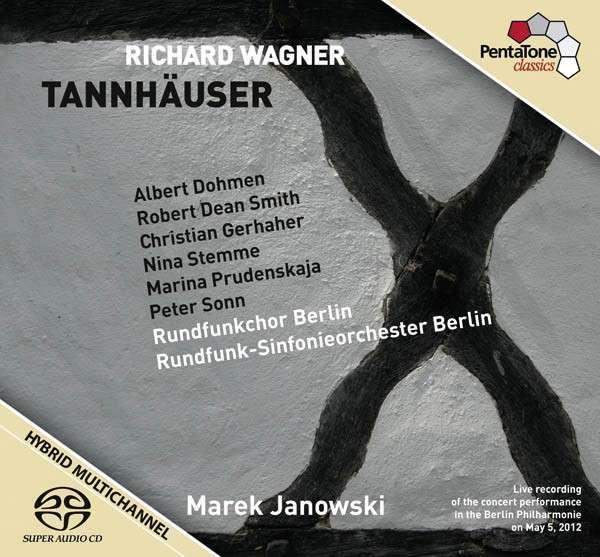|
Back
06/28/2013
Richard Wagner: Tannhäuser
Robert Dean Smith (Tannhäuser), Nina Stemme (Elisabeth), Marina Prudenskaya (Venus), Christian Gerhaher (Wolfram von Eschenbach), Albert Dohmen (Landgraf Hermann von Thüringen), Peter Sonn (Walther von der Vogelweide), Wilhelm Schwinghammer (Biterolf), Michael McCown (Heinrich der Schreiber), Martin Snell (Reinmar von Zweter), Bianca Reim (Ein junger Hirt), Sabine Puhlmann (1st Page), Isabelle Voßkühler (2nd Page), Roksolana Chraniuk (3rd Page), Bettina Pieck (4th Page), Rundfunkchor Berlin, Nicolas Fink (Chorus Master), Rundfunk-Sinfonieorchester Berlin, Marek Janowski (conductor)
Recorded live at the Berlin Philharmonie (May 5, 2012) – 170’57
Pentatone PTC 5186 405 –
Hybrid Super Audio CDs with essays in German, French, and English – Texts and translations in German and English

   
There will be Wagner–the composer’s bicentennial is bringing a luscious assortment of reissues and compilations as a tribute to the composer’s legacy. They add to an already rich and storied catalogue, but there is always room for more. This new recording of Tannhäuser from Pentatone is a wonderful example. As part of their ongoing Wagner cycle, which culminates with a complete Ring Cycle on SACD, Marek Janowski and the Radio Symphony Orchestra Berlin bring us a reading of Wagner’s work that sparkles with vibrancy and luxurious singing.
In, perhaps, Wagner’s most “Italianate” opera, the need for soaring lyricism is often all too apparent. The balance between full, heroic sound and subtle shading is of utmost importance. This recording features two of the most ideal voices imaginable today for the roles of Tannhäuser and Elisabeth and that feat alone is worth the price of admission.
Soprano Nina Stemme has been deservingly revered for several years now. Her Isolde, recorded twice, is the best of her generation. Her Elisabeth here is shimmeringly beautiful and pervaded by remarkable sensitivity. All of her arias are exceptionally sung, particularly her piercing “Allmächt’ge Jungfrau.” Her voice is luxurious in sound, wrapped in complex colors, consistent throughout the range, and thrilling. If there is a fault with it, it is that she might sound a tad too matronly for the young Elisabeth, but this is not distracting; the power of her voice outweighs this. She is the consummate Wagnerian soprano of our time. Perhaps her greatest strength is the pregnant energy she brings to the character’s most vulnerable moments. Her monologue, “Ich preise dieses Wunder,” (caressingly supported by Janowski and company), draws the listener in to the character’s vulnerable emotions.
In relating her dream to Tannhäuser, we come to a moving understanding of her fragility at their reunion. Partnered with the ardent Robert Dean Smith, their ensuing duet is exceptionally precise musically, underlined by Janowski’s driving tempo, and fervently charged.
Smith’s vocal talents set him apart. His sound has heft, but also a metallic ring that reminds one of a young José Carreras. His consistency and stamina are impressive. His first act aria to Venus, “Dir töne Lob!” is clarion and lyrical. In each succession of pleas to Venus, his dynamic abilities are pushed further, but there is never a concern with over-singing. His phrasing is secure. Dramatically he is more than adequate. In a role that can sometimes lack in empathy, his torment is palpable. His vocal abilities lend credence to Tannhäuser’s struggles and allow Wagner’s music to expand and contract. His third act aria, “Hör an! Inbrunst im Herzen,” is weighty and staggering in impact.
If there is a bigger star to the recording, however, it may be conductor Marek Janowski. Of the installments of this Wagner cycle that I’ve heard, this is easily his most successful. Janowski guides the listener with a fresh reading that while at times majestic, is never pompous. The nimbleness of his tempi are just right, not rushed. The ensemble scenes are persuasively led with direction, but musical details are clear.
The forces of the Berlin Radio Symphony Orchestra and Chorus are impeccable. The orchestra’s playing is cool and clean, yet rich in color. The lower strings and brass are particularly well balanced and refined. The chorus is one of the finest opera choruses I’ve heard recently on record, both during the song contest and the Pilgrims’ Chorus, they are exceptional.
The outstanding supporting cast is headed by baritone Christian Gerhaher. A musician of exceptional communicative prowess, Gerhaher is highly sympathetic as Wolfram. He sings with a distinctive warmth that is piercingly direct and disarmingly beautiful. Marina Prudenskaya is a searing Venus. Her powerful sound is compelling. It is an impressive and beautiful voice that makes a nice contrast to Stemme’s cooler, more covered sound. Albert Dohmen is a noble Landgrave. Peter Sonn’s Walther is finely sung and quite expressive. Wilhelm Schwinghammer’s Biterolf is a bit wooden, but formidable. On balance, the entire cast is superb.
The surround Super Audio mix is a luxurious aural feast. The three front channels are utilized exceptionally well to create the sense of a deep and multi-planed performance space. While stage movement isn’t excessive by the singers, the listener still gets a clear image of the action unfolding before his/her eyes. The “Pilgrims’ Chorus” at the beginning of the third act is a beautiful illustration. The sound is enveloping, ethereal at first, but then front and center at the apex of the piece. It is extremely moving and superbly done by the recording team at Pentatone.
What all this talent adds up to is a recording with rare emotional impact. The story of a sinner redeemed is made incomparably poignant during Elisabeth’s funeral procession during the third act. Janowski’s forces strike an ideal balance between sentimentality and empathy. This recording soars with the latter thanks to an exceptional cast and supporting forces proving that Wagner is alive and well 200 years later.
Matthew Richard Martinez
|